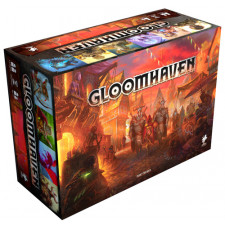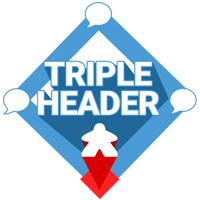Gloomhaven Review
on Mar 29, 2017

Craig:

Raf:

CC: Gloomhaven- a ground-breaking game, and not just in a hernia-inducing way. For a game of this epic scope, bit count and completion time, it’s difficult to know where to begin. It’s an audacious attempt at a GM-less roleplaying game with almost one hundred scenarios, dozens of unique enemies and close to twenty distinct character classes. What is the first thing that comes to your minds when you think of it, gentlemen?
BC: I believe the creator, Isaac Childres, has referred to it as “a full fantasy RPG world in a box,†and that’s exactly what I feel he’s accomplished. I’ve been playing a lot of Final Fantasy XV this year, and Gloomhaven gives me the exact same feeling of a fantastic world where there’s always something new to discover, always another quest waiting around the corner. It’s a world of weird and colorful races that break the typical Tolkienesque fantasy mold, miles of uncharted geography and history, and characters that never stop growing. And it’s all tied together with Euro-inspired core gameplay mechanisms that, frankly, would work just as well without the ambitious scope of the scenario book or the legacy-style components.
CC: It comes closer to the RPG experience than any other tabletop entry to date, offering a vast world of branching quests and event cards that present the party with impactful choices as they roam the city or the wilds, but the straightforward nature of each scenario keeps it at arm’s length from a true RPG in my opinion. Similar to other tabletop dungeon crawlers, the party starts at a predetermined spot and has only one win condition for each scenario, which always involves combat, so the majority of the role-playing happens outside the scenario. Gloomhaven doesn't disappoint once the minis hit the table, though, and its card-based system handles encounters the way I wish Mage Knight would have.
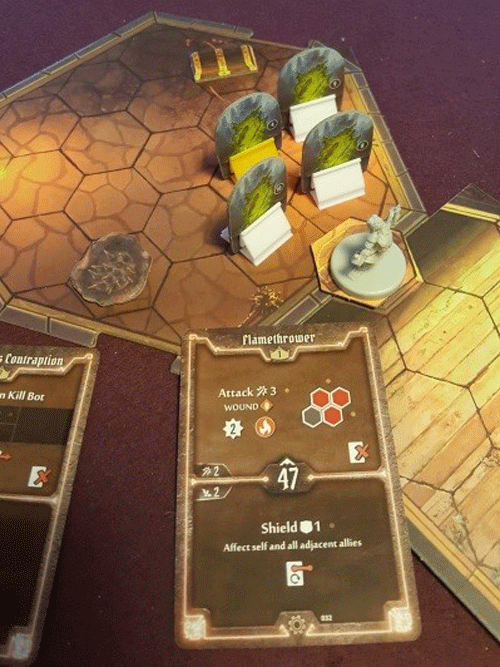
Say hello to my little friend!
RC: If you zoom in on the card-based play of Gloomhaven, Mage Knight is the obvious comparison and I completely agree that it’s better. Deciding when to use your vast array of options, which order to use them in, and the tantalizing decision of which half of the card to execute is nothing short of brilliant. There are many decisions to make each round, both minor and major, and they’re compelling without feeling bogged down in minutia. The goals are clear, but the path to them is varied and exciting.
BC: I’m not going to commit the blasphemy of saying it’s better than Mage Knight, but I agree that the cardplay is tantalizing. So many decisions go into each moment. You always have to play two cards, one for the top effect and one for the bottom, but one of these cards also determines your place in initiative order, a decision you have to make before you see enemy initiative. If you want to play a stun or disarm effect before enemies act, you’ll want to make sure you have a low-initiative card on top, even if you’re throwing away its ability.
There’s also the excruciatingly difficult choice of when and how to rest. Since you start the game with your entire deck in hand and lose a card (for the rest of the scenario) every time you take back your discards, each battle is more an efficiency puzzle than a traditional dungeon crawl. As your hand gets smaller, you need to rest more often, accelerating these losses. Some of the more powerful cards are also lost immediately when played, and you can lose cards to absorb otherwise lethal damage, so your hand and choices are always dwindling until your character becomes exhausted and is removed from the battle. You had better hope you accomplished your scenario goal before then, not to mention your individual battle goal. I’ve found that most scenarios are nail-biters, typically won on the turn before I would become exhausted.
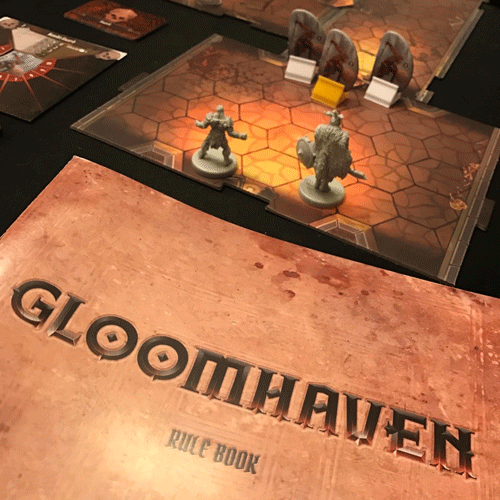
The adventure begins.
CC: The scenarios definitely gave that cliffhanger feel, which illustrates why the creator recommends you not play with the alternate “permadeath†rule. I attempted this, but the dungeon design combined with the sometimes-fickle damage deck makes it difficult to keep your favorite characters alive. Drawing the Null card, which completely negates even the most well-crafted attack, four times in a single encounter is a recipe for doom regardless of your strategy, so that legacy aspect of the game is best left unexplored, as Mr. Childres intended.
BC: Yeah, I’m not touching the permadeath rule. It’s a nice consideration, but the mechanics clearly don’t support it. In fact, getting small rewards even for failed scenarios (the XP and gold you collected during play) is one of the best parts of the game, giving every play some feeling of progress- which is needed, because the progression in the game is otherwise very slow.
CC: Initiative cards, on the other hand, are great for two reasons. In addition to the strategic layer you mentioned, they also add to the monsters’ personalities. Giant golems and slow-moving oozes typically go later in the round, as befits a lethargic being, while small monsters and agile characters have more low-initiative-number cards. It’s another tiny wrinkle that adds to the well-rounded flavor of the game.
RC: Man, those attack decks. I have two very minor complaints with Gloomhaven, and those attack decks are one of them. Granted, I’m not very deep in the campaign as I’ve opted to play the opening scenarios repeatedly to try all the classes, but so far those Null and 2x Crit attacks feel out of place. The action card system is a fluid puzzle of optimization that I adore. Most of the modifiers feel fine but then suddenly WHAM you’re hit with one of two extremely dramatic swings. The crit can turn a ho-hum attack into a kill and the null can negate an expertly planned turn on a whim. My other nitpick is similar, though the opposite perspective. The campaign and storytelling is rich and dramatic which makes loot disappearing at the end of a scenario feel odd. It’s a mechanical consideration, necessary to add tension to your action choices that contrasts with the drama of the fantasy setting. Meanwhile the action deck is a dramatic consideration that contrasts with the rich mechanical decisions of card play!
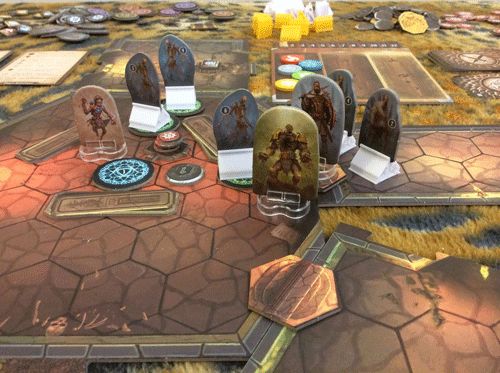
A crowded crypt.
BC: The loot rule doesn’t bother me--as you point out, it’s needed to maintain mechanical tension, and it’s not the only rule that makes no thematic sense. I don’t share your concerns about the attack deck, either, mostly because those attack modifier cards add so much that dice couldn’t accomplish. Every level up lets you tweak your character’s deck by taking “perks,†adding new, good cards and removing bad. A lot of these add additional effects like elemental infusions or status modifiers that would not be possible with regular hexahedra. And the way blessings and curses work by shuffling in additional, one-use X2 and null cards is brilliantly thematic, not to mention scenario effects like chilly caverns adding additional negative modifiers.
The leveling in the game is really compelling because you get to manipulate both your attack modifier deck and your action deck, plus any equipment or, later, enhancements you buy. It really gives you the chance to specialize and synergize as you see fit. Additionally, being forced to choose a subset of your unlocked abilities at scenario start is yet another tough but rewarding decision. But now we’re getting into the legacy aspects of the game, which is where I do have some quibbles. I think Craig has gotten the farthest of all of us--what are your thoughts regarding the long game?
CC: Gloomhaven may be the first game to truly earn the legacy title. I've completed quests, retired characters and revealed new ones, deciphered messages that have nothing to do with Ovaltine, and probably caused my wife to rethink her position on this hobby of mine. This game takes a long time, so a traditional sense of completeness may be difficult to achieve, but that's also its magic.
The great part of Gloomhaven legacy is the feeling that you're in a world. Saying goodbye to your first character after upgrades and close calls is bittersweet, but it gives the sense of individual purpose. Others may carry on to see what's out there, but my Scoundrel’s moving on, her vengeance sated. Running into her later in the game, while brief, brought a smile to my face and a “You know her?†from new players. That sense of...maybe belonging is the best word, is something new and special in tabletop gaming.
RC: The world of Gloomhaven is alive. The game has been on my table since I’ve got it and I haven’t put it away. 1 turn here, 1 turn there, and 45 minutes in the morning...I’m going back to this world over and over. The way your characters live and inhabit this world is something I haven’t seen in board gaming.
BC: I love the world building, too, and the writing is solid across all the scenarios, events and character bios. What really makes the legacy aspect work for me, though, is that there are no wasted games. If I fail a mission, my character is not permanently killed or scarred; it’s very forgiving in that respect, which encourages experimentation rather than the paralyzing pressure some legacy games create. In fact, even a failed mission rewards a small amount of gold, XP and potential progress in your Personal Quest. There’s a sense that you’re always moving forward but not at the breakneck, “no looking back†pace most legacy games set. If I do get stuck, there are always 3-4 side scenarios or alternate story branches available to play, plus random quests. I feel the freedom to explore instead of being shuttled along a track.
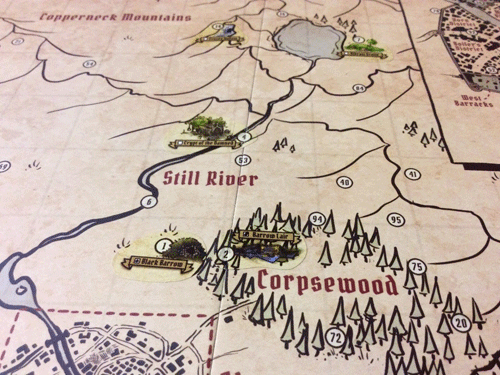
The world map comes to life as players unlock and complete scenarios.
Some parts are less successful. The world map is a gorgeous artifact, open vistas gradually filling up with colorful stickers representing the scenarios you’ve unlocked, but it’s also functionally useless and has no business being a cardboard-mounted board. It really ought to have been the first two pages of the scenario book. The event cards can be frustratingly arbitrary, and many of them are permanently removed from the game after you’ve taken your first crack at them, even if you get a “nothing happens†result. The very first Road Event I encountered unlocked a mysterious new City Event card, but if I had taken the other path, I would have gotten nothing and permanently lost the opportunity. I’ve already encountered a scenario that lets me choose what to unlock next, except one of those choices is objectively worse because I can easily unlock it via other means. My biggest gripe of all is that the game literally buckles under its own weight. Due to the huge variety in monsters, maps and overlays, getting things set up and put back is a minor nightmare. I think that if the scenario-level gameplay weren’t so sharp, people would be a lot more critical of some of these choices.
RC: It’s definitely got some warts around the edges, but I don’t hold them against the game. It’s so vast and ambitious that they’re easy to ignore. Not in the sense that you hold your nose and move past them, just that when you walk away from the table you don’t remember any of it. What sticks with you is the phenomenal card play, the story you’re writing and experiencing, and the weight of every decision you’ve made along the way. Gloomhaven inhabits, figuratively and literally, a space in your world.
CC: This certainly isn't a game to pull out because you have an hour to kill or seek instant gratification, and the quest system definitely creates varied experiences like the ones Byron mentioned, or my friend's character retiring after his second scenario, or my other starting character who's two dozen missions in and hasn't yet unlocked the areas needed to fulfill his destiny, but that can add to the sense of a living world if players adapt to its variance and invest in the experience.
Me, I'm investing, and like Raf, I'm focusing on how Gloomhaven lets players decide what their end will be, bringing the freedom of role-playing closer to the tabletop dungeon crawl than anything before it. Its minor glitches will fade from memory over time while thrills, joys and sorrows remain, and the map will mark our legacy forever.

 Customer Support
Customer Support  Subscribe
Subscribe 




 Account
Account  Wishlist
Wishlist 
